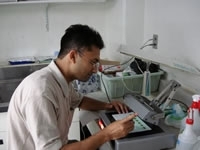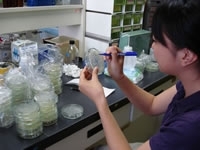Course Outline
Science of Biological Environment
Specialized Courses
It is of vital importance, today and in the future, to expand, improve, and conserve fertile farmland and forests, which are the basis for biological production. Preserving farmland and forests from disaster and devastation are also very important.
It is particularly worthy of note that not a few recent world-wide environmental problems are in the area of agriculture. To solve and to cope with these problems, research programs have been developed, and various subjects are offered by scholars pursuing research relevant to these problems through advanced technology using physical, chemical, and biological methods.
Outline of Major Chairs [Rengo-Koza]
Agricultural & Environmental Engineering

Detection of camalexin
(antibiotic substance)
from Arabidopsis plants
Research and education are conducted on principles of land and water engineering and physical planning for the consolidation and conservation of farmland and forests, which are the foundation of biological production. Research and education on mechanization of farm work are also carried out for increased labor productivity and supply of agricultural products. Specifically, conservation, disaster prevention, improvement and consolidation of farmland and forests, construction of relevant structures, development and utilization of machinery are the main subjects in this major chair. The main objective is sustainable development and utilization of natural resources over the long term to establish a sound foundation for biological production and a comfortable living environment for human life.
Management of Biological Environment

Counting pathogenic population
using a selective medium
The purpose in this major chair is to understand the principle of the ecological structure and function in various circumstances such as crop fields, forest areas and other useful locations with agricultural facilities, and to analyse the ecological changes or scientific phenomena in both natural and artificial conditions. More reasonable and theoretical practices for the control of plant growth and crop management are discussed and implemented in the advanced program with higher biological techniques, including pathological, entomological methods, and artificial techniques using agricultural-specific facilities or equipment.
